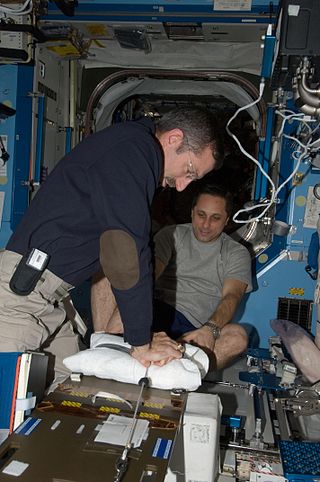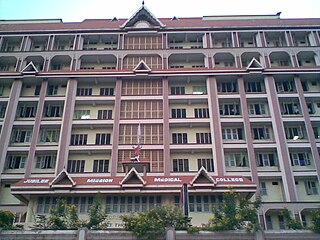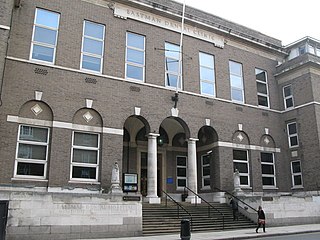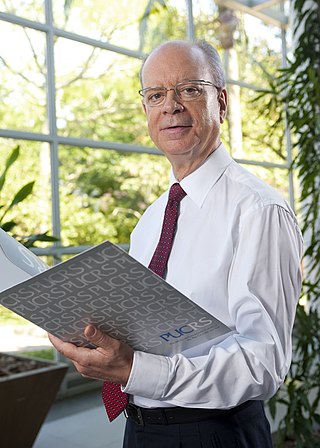
Dafydd Rhys Williams OC OOnt CCFP FCFP FRCPC FRCP FRCGS is a Canadian physician, public speaker, CEO, author and a retired CSA astronaut. Williams was a mission specialist on two Space Shuttle missions. His first spaceflight, STS-90 in 1998, was a 16-day mission aboard Space Shuttle Columbia dedicated to neuroscience research. His second flight, STS-118 in August 2007, was flown by Space Shuttle Endeavour to the International Space Station. During that mission he performed three spacewalks, becoming the third Canadian to perform a spacewalk and setting a Canadian record for total number of spacewalks. These spacewalks combined for a total duration of 17 hours and 47 minutes.

Norman Earl Thagard, M.D., is an American scientist and former U.S. Marine Corps officer and naval aviator and NASA astronaut. He is the first American to ride to space on board a Russian vehicle, and can be considered the first American cosmonaut. He did this on March 14, 1995, in the Soyuz TM-21 spacecraft for the Russian Mir-18 mission.

Lawrence James "Larry" DeLucas is an American biochemist who flew aboard NASA Space Shuttle mission STS-50 as a Payload Specialist. He was born on July 11, 1950 in Syracuse, New York, and is currently married with three children. His recreational interests include basketball, scuba diving, bowling, model airplanes, astronomy and reading.

Chiaki Mukai is a Japanese physician and JAXA astronaut. She was the first Japanese woman in space, the first Japanese citizen to have two spaceflights, and the first Asian woman in space. Both were Space Shuttle missions; her first was STS-65 aboard Space Shuttle Columbia in July 1994, which was a Spacelab mission. Her second spaceflight was STS-95 aboard Space Shuttle Discovery in 1998. In total she has spent 23 days in space.

Venturing into the environment of space can have negative effects on the human body. Significant adverse effects of long-term weightlessness include muscle atrophy and deterioration of the skeleton. Other significant effects include a slowing of cardiovascular system functions, decreased production of red blood cells, balance disorders, eyesight disorders and changes in the immune system. Additional symptoms include fluid redistribution, loss of body mass, nasal congestion, sleep disturbance, and excess flatulence. Overall, NASA refers to the various deleterious effects of spaceflight on the human body by the acronym RIDGE.
Aberdeen University School of Medicine, Medical Sciences & Nutrition contains the Medical School and Dental School at the University of Aberdeen in Scotland. It also provides training and carries out research in medical sciences, nutrition, public health, dentistry, health sciences, physician associate studies at BSc, MSc, and PhD levels. The current school was formed from the merger of the former School of Medicine & Dentistry, School of Medical Sciences, and the Rowett Institute of Nutrition.

Space medicine is the practice of medicine on astronauts in outer space whereas astronautical hygiene is the application of science and technology to the prevention or control of exposure to the hazards that may cause astronaut ill health. Both these sciences work together to ensure that astronauts work in a safe environment. The main objective is to discover how well and for how long people can survive the extreme conditions in space, and how fast they can adapt to the Earth's environment after returning from their voyage. Medical consequences such as possible blindness and bone loss have been associated with human spaceflight.
Kevin Jeremy San Yoong Fong is a British doctor and broadcaster. He is a consultant anaesthetist and anaesthetic lead for Major Incident Planning at UCL Hospitals. He is a professor at University College London where he organises and runs an undergraduate course Extreme Environment Physiology. Fong also serves as a prehospital doctor with Air Ambulance Kent Surrey Sussex and specialises in space medicine in the UK and is the co-director of the Centre for Aviation Space and Extreme Environment Medicine, University College London.

Dava J. Newman is the director of the MIT Media Lab and a former deputy administrator of NASA. Newman earned her PhD in aerospace biomedical engineering, and Master of Science degrees in aerospace engineering and technology and policy all from MIT, and her Bachelor of Science degree in aerospace engineering from the University of Notre Dame. Newman is the Apollo Program Professor of Aeronautics and Astronautics and Engineering Systems at the Massachusetts Institute of Technology and a member of the faculty at the Harvard–MIT Program in Health Sciences and Technology. She is also a MacVicar Faculty Fellow, former director of the Technology and Policy Program at MIT (2003–2015), and has been the director of the MIT Portugal Program since 2011. As the director of MIT's Technology and Policy Program (TPP), she led the institute's largest multidisciplinary graduate research program, with over 1,200 alumni. She has been a faculty member in her home department of Aeronautics and Astronautics and MIT's School of Engineering since 1993.

The Pontifical Catholic University of Rio Grande do Sul is a private non-profit Catholic university. With campuses in the Brazilian cities of Porto Alegre and Viamão, it is the largest private university of the state of Rio Grande do Sul and the first university founded by the Catholic religious institute of the Marist Brothers. PUCRS is considered the best private university of Brazil's Southern Region by the Ministry of Education (MEC), and one of the best private universities in the country, with FGV, PUC-Rio and the PUC-SP.
Air vice-marshal John "JE" Ernsting was a senior Royal Air Force (RAF) commander and renowned medical researcher.

The Microgravity Centre, colloquially known as the "MicroG", at PUCRS university, Porto Alegre, Brazil, was initially created as a laboratory in 1999 by Professor Thais Russomano MD MSc PhD, as the first academic and research establishment dedicated to Space Life Sciences in Latin America. It evolved into a fully multidisciplinary centre in 2006, expanding its areas of research beyond aerospace medicine and engineering, to include pharmaceuticals, biomechanics and physiotherapy, among others.

Jubilee Mission Medical College and Research Institute is a private, non-profit Christian minority medical college, hospital and research institute located at Thrissur in Kerala, India. The establishment is administered by the Jubilee Mission Hospital Trust, a charitable organisation under the Catholic Archdiocese of Thrissur.
The National Space Biomedical Research Institute (NSBRI) was a NASA-funded consortium of institutions studying the health risks related to long-duration spaceflight and developing solutions to reduce those risks. The NSBRI was founded in 1997 through a NASA Cooperative Agreement. The founding director was Laurence R. Young of MIT. NSBRI's 16,400-square-foot headquarters facility was located in the BioScience Research Collaborative in Houston, Texas. The Institute shared the facility with Baylor College of Medicine's Center for Space Medicine. The official opening was held March 19, 2012.

The UCL Eastman Dental Institute is the dental school of University College London (UCL) and an academic department of UCL's Faculty of Medical Sciences. The institute is based on Gray's Inn Road in the Bloomsbury district of London, United Kingdom, adjacent to the Eastman Dental Hospital, with which it is closely associated.

Tara Melaine Ruttley is Associate Chief Scientist for Microgravity Research at NASA Headquarters in Washington, DC. Prior to this, she was Associate Program Scientist for the International Space Station (ISS) at NASA's Johnson Space Center in Houston, Texas. Until 2007, she was lead hardware engineer for the ISS Health Maintenance System, leading a team of engineers whose job was to provide reliable medical equipment that kept astronauts healthy in orbit. She subsequently served as the lead hardware engineer for the ISS Human Research Facility. She served as an aquanaut on the NASA Extreme Environment Mission Operations 6 crew in July 2004.

Joaquim Clotet Martí holds a doctorate in Philosophy and Letters, with outstanding work in the area of Ethics and Bioethics. Since 2004, he has been the President of the Pontifícia Universidade Católica do Rio Grande do Sul (PUCRS), Porto Alegre, Brazil.

Julielynn Yee-Ching Wong is a physician, scientist and pilot, who is internationally recognized for using 3-D printing to deliver healthcare solutions to remote environments, including outer space. Wong is the founder and CEO of two organizations: 3D4MD and Medical Makers.
Garatéa-L is a space probe planned by the Brazilian company Airvantis with the support of institutions such as INPE, IMT, ITA, LNLS/CNPEM, PUC-RS, UFSC, USP and USRA. It will be the first Brazilian mission in deep space, as well as the first directed to the Moon. The CubeSat will be launched by an Indian rocket PSLV-C11 as part of the Pathfinder mission, which will pioneer deep space commercial exploration through a partnership between British private companies with the UK Space Agency (UKSA) and the European Space Agency (ESA).
Tamarack "Tam" R. Czarnik is an American medical researcher, notable for space advocacy and academic studies of human physiology in extreme environmental conditions. Czarnik is especially known for his scientific contributions to space medicine as well as a better understanding of such phenomena as ebullism and uncontrolled decompression. He is the author of a number of publications in the domain of bioastronautics including "Ebullism at 1 million feet: Surviving Rapid/Explosive Decompression" and "Medical emergencies in space". Czarnik was at the origin of the Mars Society Chapter foundation in Dayton, Ohio, and also served as the chapter's first Chair. From 2001 to 2011, Czarnik served in several missions as Medical Director for the Mars Society's FMARS and MDRS, simulated Mars habitats.














